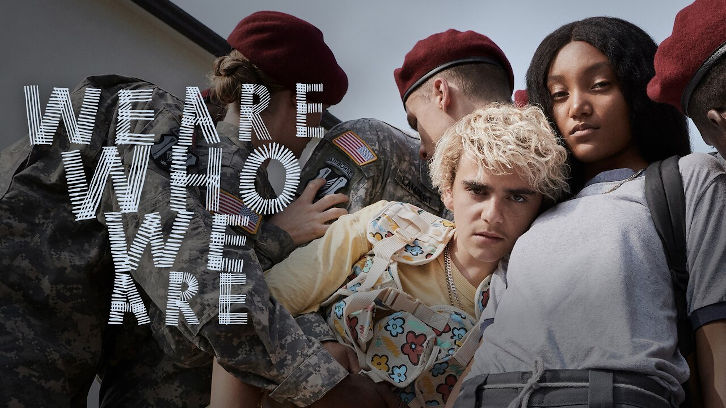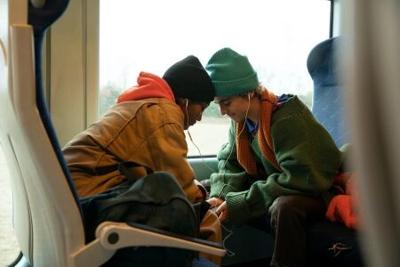 When I finished the final episode of We Are Who We Are, I turned my head and said, “I feel insane. Every episode of this show makes me feel insane and I’m not sure of anything.” I think the show set out to be a treatise on the coming of age experience. How we spend our adolescence figuring out who we are, which makes it impossible for other people to truly know us. How people will always try to know and define us. How they’ll use our visible selves to make assumptions and judgements. How even after adolescence we will continue searching for our truest selves. How we’ll constantly explore, adapt, discard, and evolve. Honestly though, I don’t know that the show succeeded, and could that be the point? That we evolve? That it’s messy?
When I finished the final episode of We Are Who We Are, I turned my head and said, “I feel insane. Every episode of this show makes me feel insane and I’m not sure of anything.” I think the show set out to be a treatise on the coming of age experience. How we spend our adolescence figuring out who we are, which makes it impossible for other people to truly know us. How people will always try to know and define us. How they’ll use our visible selves to make assumptions and judgements. How even after adolescence we will continue searching for our truest selves. How we’ll constantly explore, adapt, discard, and evolve. Honestly though, I don’t know that the show succeeded, and could that be the point? That we evolve? That it’s messy?We Are Who We Are follows two teens in late 2016 on an America military base in Chioggia, Italy. Fraser Wilson (Jack Dylan Grazer) is a recently arrived emotionally erratic, loner. His movements are sudden and jerky, leaving the audience feeling twitchy. The movements of his body match the quickness of his mind and the explosiveness of his emotions. He goes from slapping his mother, Sarah Wilson (Chloe Sevigny), to pressing his body between her open legs as she wraps her naked thighs around him. If that sentence made you feel uncomfortable, you understand the bizarre line their relationship walked. There are also some assumptions placed upon Fraser's sexuality early in the season, Fraser never defines himself, and I wasn’t about to let the show do it for him. I’m not sure if the writers hoped the audience would go along with other character’s telling us who Fraser is to only turn around and point an accusing finger at our closed-mindedness. It didn’t work. I think most of us know that what someone wears or reads or listens to isn’t an indication of who or how they love. Caitlin Poythress (Jordan Kristine Seamon), Fraser’s inevitable soulmate, is a popular daddy’s girl realizing that gender and sexuality exist beyond the binary. Funny enough, her exploration of masculinity leans into the binary. She sees masculinity as peeing standing up, rocking facial hair, and going to the barber. All of this she keeps a secret from her parents and half-brother. Her father, Richard Poythress (Kid Cudi), is a bitter man, while her mother, Jenny (Faith Alabi), is coming to terms with how much of her identity she has given away to be a military wife. Caitlin’s relationship with her mother is distant, while she enjoys a closeness with her father, joining him in his mildly criminal enterprises until she gets her period. It signals a new beginning to their relationship for him, but for Caitlin nothing has changed other than the way he treats her. It would be cheap to associate her interest in masculinity and maleness with her father’s abrupt change toward her, but I’m not convinced the show doesn’t view that as a contributing factor. For a series that wants to push against societal norms and expectations, Caitlin’s views on maleness was sloppy and disappointing. I expected a less gendered exploration of the masculine and the feminine, but we didn’t get that here. I suppose we could chalk it up to her being young and it being 2016.
I was about to ask if we really were that unevolved in 2016, but then I remembered. In fact, the show wouldn’t let me forget. Sprinkled throughout are reminders of the 2016 U.S. Presidential Election, the campaign and it’s ultimate victor. Experiencing it again was an unwelcome interlude that added little if anything to the plot. Fraser and Caitlin come together gradually, and the audience isn’t necessarily privy to how they move from wary strangers sharing a beach to inseparable soulmates sharing a beautiful sunrise in Italy. I mean that literally. One day they are strangers on a beach and soon after they are inseparable, teasing and cozying together in Fraser’s room. In between, we see Caitlin lay claim to Fraser when he shares a kiss with one of their drunk friends, and we watch as he grows jealous of the close relationship Caitlin shares with his mother. All along the show championed the relationship as a platonic one, and there aren’t enough platonic love stories, so I was disappointed when the final episode muddied the waters. Not because moving from friends to something else doesn’t happen. It does. I just didn’t want it to happen.
Outside of Fraser and Caitlin, We Are Who We Are, relied heavily upon the coming of age experience, but the moments of teenage rebellion felt more like what adults imagine of adolescence. It’s always so odd when adults exaggerate the teenage experience because they lived it. Ten or twenty or thirty years ago perhaps, but they lived it. Is it so forgettable or just that easy to treat your memories like Fast and Furious sequels—bigger, faster, louder? Adolescence is not a constant party of Bacchanalian proportions. And for a show that worked so hard to root itself in believability, it was the kids partying that rang false. Sex, drugs, drinking, loud music, bad dancing while a miasma of vomit settles on your skin —absolutely. Breaking into homes and pushing baby grand pianos through floor to ceiling glass walls because you’re sad and mad—not so much. Along the way, there are some deep subplots. Plots worthy of more than the surface exploration they received, but then that’s the danger of overfilling a show with big issues. Alongside the uneven study of identity are infidelity, misogyny in the military, what it means to be a mother, the cost of war, religion as solace, parent-child relationships, and marriage. Perhaps a possible season two will take a more indepth look at one of these crumbs. Each one would be worthy, but Danny Poythress’ (Spence Moore II) use of religion to feel closer to a birth father he doesn’t know, as well as to make sense of the cruel world is a compelling story when contrasted with his violent outbursts. Danny, like Fraser, has a manic energy, but where Fraser’s lives on the surface, Danny’s bubbles beneath, and the audience is never sure of what he might do next. It’s completely unnerving.
Luca Guadagnino, co-creator and director, said he wanted the audience to feel “confused and restless.” In this he succeeded, but that success means I was left unsatisfied. I had high hopes for We Are Who We Are. How could I not? It has an impressive pedigree, and whatever else I might say about it the performances were immersive and believable. Every actor inhabited the character they portrayed and no gesture ever felt too big or small. Everything clicked together. They director should be applauded for this seamlessness. The cast should be celebrated for their skill.
We are who we are. We are messy. We are violent. We are ever-changing. Perhaps these people were too messy. While the visual medium is always meant to make you feel a voyeur, this time it made me feel complicit in toxic relationships, problem drinking, outsized violence, and questionable consent. They definitely are who they are, but I don’t want to be one of them. Perhaps that is the ultimate point.




